Top 10 Best Allergy and Immunology Hospitals in Chennai

Top 10 Best Allergy and Immunology Hospitals in Chennai
In the medical system, hospitals are essential. Hospitals are healthcare facilities with organised medical staff and other certified personnel to provide daily and ongoing medical, nursing, radiological, laboratory, and associated services. To treat acute and chronic illnesses brought on by diseases, traumas, and genetic anomalies, hospitals provide a variety of acute, convalescent, and terminal care employing diagnostic, preventative, and treatments. Hospitals have been able to produce crucial data for research, knowledge, teaching, and management thanks to all these different services.
One of the most crucial pillars of any civilization is the hospital. They represent the practical application of one of the pillars that support a country’s infrastructure: healthcare. A nation’s ability to support its population by providing a suitable number of hospitals with the right resources and amenities in each. With high levels of pollution and changing lifestyles, hospitals are becoming more and more significant in people’s lives today. As a result, more and more people are contracting illnesses and needing access to quality medical care.

A patient can receive more therapy alternatives in a hospital than they would at home, even in the most primitive or outdated hospitals. Medical tools are available at hospitals to help with the diagnosis and care of the sickest patients. Consider the example of an accident. Taking a hurt person to a doctor’s private room or calling the doctor at home won’t ensure the same level of fast and adequate care that a hospital will. All of these services, emergency operations, critical care, and life support systems can be found only in hospitals.
A hospital visit will reveal a plethora of doctors, nurses, and interns bustling around. There will always be more than one doctor treating a patient at once. When properly executed, this practice gives the patient the best care possible given their condition. To provide the patient with a clear diagnosis and course of therapy, doctors consult with one another about a particular situation. Patients can get as many opinions as they desire because there are multiple doctors and nurses available. Most significantly, no patient will ever be left alone at any time in a hospital with enough staff.
Without hospitals, we would have needed to find a speciality doctor in their office for our specific disease. The patients and their families would have a lot of bothers, which would result in precious time being wasted on non-essential matters. Hospitals have significantly trimmed down that search. We can bring patients to a hospital and be led to the appropriate wing, where the appropriate doctors will handle everything else.
For a sizable portion of the population, hospitals provide a big source of employment. For new doctors and nurses, working in a hospital is quite handy and advantageous because it gives them a variety of user experiences that they need. In addition to this, hospitals also employ a sizable number of individuals in occupations that are not directly associated with providing healthcare, such as maintenance workers and equipment handlers.
Patients from poor neighbourhoods can receive treatment alternatives at a considerably lower cost at hospitals that receive government assistance or funding. In many cases, people from underprivileged neighbourhoods receive free healthcare, of course depending on the nation’s infrastructure. Without hospitals, everyone would have to rely on the far more expensive private doctors, making it nearly difficult for the poor to get the appropriate care they need.
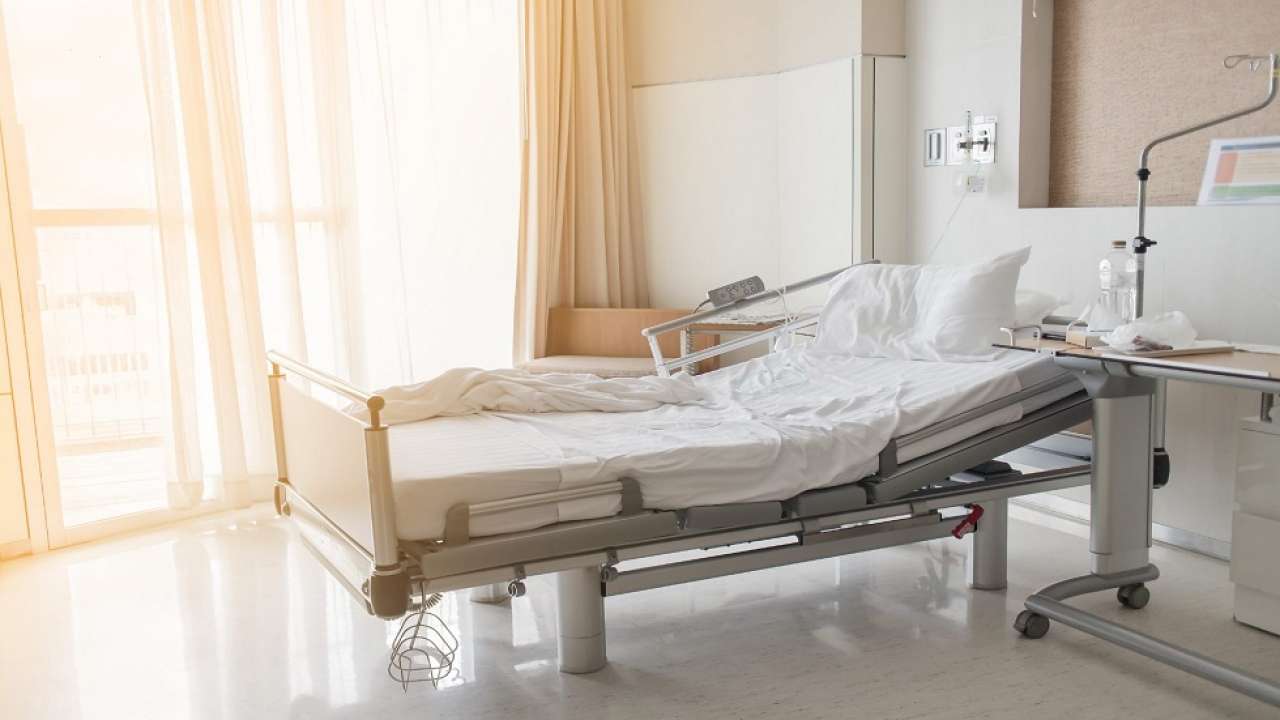
Through hospitals, a nation’s government spreads information about illness prevention and vaccination. The infrastructure a hospital provides makes it possible to efficiently and easily administer free immunizations to a large number of people; without it, the system would be disorganised and hard to manage.
Hospitals offer the specific care that particular ailments demand. A person cannot be treated at home if they are contagious or if they have biohazardous bacteria on them. Once more, some illnesses demand ongoing care that can only be provided by a hospital infrastructure. A hospital is sometimes the only place where patients with psychological disorders, trauma cases, or abuse can be treated safely. Each segment of the population is guaranteed to receive the appropriate and specific care that they require thanks to specialised facilities for both animals and various ailments.
Hospitals have historically been linked to illness rather than health. When we are ill, we go to the hospital because we are accustomed to getting our issues fixed quickly. However, by promoting the value of lifestyle changes and offering counselling services even before the patient becomes unwell, hospitals can play a much more significant role. By doing this, we can make our population far healthier and spend a lot less on healthcare than we do now.
The Importance of a Hospital
Here are a few other explanations for why a hospital is necessary, in addition to its relevance and importance in society.
- Hospitals are crucial for treating a variety of illnesses, diseases, and bodily function abnormalities, both small and significant.
- Hospitals provide curative services in addition to providing information on illness prevention and health promotion.
- Hospitals offer a secure setting for those who lack these protections at home or in the community due to either their contagious condition or mistreatment of any kind.
- Anyone at any moment with any type of health concern has access to a hospital.
- Hospitals also employ professionals in the medical field, including nurses, doctors, and other support staff.
- The hospital setting also advances nursing and medical knowledge, fostering research in numerous sectors.
Immunology and Allergy
The field of medicine known as allergy and immunology is devoted to the care and treatment of immune system disorders, including allergic disease and associated symptoms and reactions, such as asthma, rhinitis, sinus issues, seasonal allergies, and potentially fatal drug, food, and vaccine reactions. The hundreds of immunological illnesses that impact millions of individuals are covered by allergy and immunology.
Allergy and immunologic diseases are significantly more frequent than one may imagine, affecting millions of people globally. The majority of persons who have allergies do so as a result of their immune systems overreacting to generally harmless chemicals.
The treatment of immune system disorders is a focus of allergy and immunology. These illnesses affect people of all ages, affect different organ systems, and range in severity from the very common to the extremely unusual. An allergist/immunologist (also referred to as an “allergist”) commonly treats the following diseases:
- Allergic eye conditions like allergic conjunctivitis
- Respiratory illnesses such as occupational lung disorders, allergic rhinitis, sinusitis, asthma, and hypersensitivity pneumonitis.
- Gastrointestinal illnesses are brought on by immunological reactions to foods, such as eosinophilic esophagitis or gastroenteritis and enteropathies brought on by food proteins.
- Atopic dermatitis, contact dermatitis, acute and chronic urticaria, or angioedema are examples of allergic skin diseases.
- Adverse effects from things such as foods, medicines, vaccines, stinging insects, and others.
- Illnesses that predominantly affect the immune system, such as primary immunological deficiencies like severe combined immune deficiency syndromes, antibody deficiencies, complement deficiency, anomalies in phagocytic cells, or other impairments in innate immunity and acquired immune deficiency.
- Anaphylaxis and other systemic illnesses involving mast cells or eosinophils are examples of such illnesses.
- Diseases like auto-inflammatory disorders are characterised by autoimmune reactions to self-antigens.
- Organ, bone marrow, and/or stem cell transplantation
What are Allergies?
Even though an allergen may be ingested, an allergic reaction may not manifest right away. As a whole, the approach gives the immune system time to develop a sensitivity to the allergen before it causes a response. The immune system’s role also includes recognising and remembering the allergen, a process that takes time. When the immune system comes into contact with the allergen, it produces molecules called IgE antibodies that cause sensitivity to the substance in question.
Histamine and other substances are released in response to them, causing swelling and inflammation. Sensitization is the term used to describe this process. For some people, this sensitization process could take a few days or even several years. The patient might only suffer a few of the allergy symptoms, though not all of them.

The Symptoms of an Allergy
Two of the most frequent triggers for allergic responses are inflammation and irritation. The type of allergen, however, determines the symptoms and indications. Allergic reactions may affect the sinuses, airways, eyes, nose, stomach, skin, and nasal passages. Many people could mistake allergic reactions for other illnesses. While hay fever and the common cold have different causes, the irritations they produce are comparable.
Reasons for Allergies
IgE, also known as immunoglobin, is an antibody that targets the immune system and causes allergic reactions. Then, these particular antibodies are launched to battle foreign and perhaps harmful bodily components. The IgE that is released causes the creation of substances that cause the allergic reaction in an attempt to destroy the allergen. Another molecule, histamine, causes the blood vessel walls and the muscles in the airways to constrict. The chemical commands the mucus production of the nose lining.
Who is Most Susceptible to Developing Allergies?
The following people are most susceptible to allergies:
If asthma or allergies run in your family.
A newborn baby or a small kid.
If you have ever had asthma.
If there is not enough sunlight exposure.
If you have ever had allergies before.
If you have had a caesarean delivery.

Some Common Allergens
There are no geographical limitations on the appearance of possible allergies. In actuality, any food can trigger an allergy. For instance, some components in food, such as gluten, the protein found in wheat, etc., can cause an allergic reaction.
There are, however, eight food groups that are particularly likely to cause allergies, including; eggs, particularly egg whites, fish, milk, the nuts of trees, peanuts, soy, wheat and shellfish. Allergies may also be caused by other elements.
The Diagnosis
During the initial consultation, the patient and healthcare professional will talk about the most common allergic symptoms, including how often they occur and what causes them. The patient’s family history of allergies may also be a topic of discussion with the doctor. Following the initial appointment, diagnostic tests may be advised, and the patient may then be sent to a specialist.
What is the Treatment?
Being able to avoid contact with the potential allergen is the best and most successful therapy and management for an allergy. It might not always be able to do that. So, among the therapy options for allergies are:
- Drugs and medications help to lessen the severity of an allergic reaction’s symptoms. It does not, however, actually address the underlying problem. The majority of allergy medications are available over-the-counter. It is advised that you speak with a doctor before taking any medications.
- Antihistamines aid in preventing histamine’s effects. Antihistamines should not be given to children, hence it is advised that this treatment be administered with caution.
- Decongestants are short-term medications that aid in clearing the nose when hay fever, pet allergies, or dust allergies are present.
- Antileukotrienes or leukotriene receptor antagonists are particularly helpful for asthma medications that obstruct leukotriene effects.
- To lessen nasal congestion, steroid sprays are given to the interior linings of the nose.
- Hyposensitization, another name for immunotherapy, is the process of rehabilitating the immune system by administering allergens. Over an extended period, perhaps years, the dosage is steadily increased.
By assisting in lowering the inclination of the allergens that cause IgE formation, allergy therapy aims to long-term induce tolerance.
Clinical Immunology
Immunology was once solely assumed to be specifically connected to infectious disorders because it originated as a subfield of microbiology. The development of the field of immunology is based on the study of infectious diseases and how the body reacts to them. The idea of germ theory was also founded on this.
What is Clinical Immunology?
Clinical immunology is a medical sub-discipline that focuses on a specific physiological process called inflammation that is extremely necessary for optimal health, specifically combatting pathogenic organisms, recovering from damage, and containing neoplasms. In turn, the pathophysiology of the condition that is mediated by the cells and soluble products and affects nearly every organ system in the body is influenced by the inflammation.
Clinical immunologists must work to narrow down a bewildering array of disease descriptions to methodically identify the pathogenic pathways. Additionally, they look into ways to translate knowledge more quickly and look into fresh findings that might be more efficient in terms of preventing and treating disease.

What does clinical immunology involve?
The following are involved in clinical immunology:
- Conditions that are the outcome of immune system problems that may be brought on by abnormal cellular activation, malignant or cancerous growths, under-or over-activity, or failure of any cellular system in the body.
- Pathology of the diseases in which immunological responses also play a significant impact.
- Drugs and medications with the power to alter or regulate the immune system.
- With the use of vaccines, the immune response to specific diseases can be controlled.
Immune System Disorders
These are the broad classifications of diseases brought on by immune system problems:
- If the immune system is unable to mount the necessary defences against infections, immunodeficiency will eventually set in. Immunodeficiency is thought to be a reaction to certain long-term illnesses, such as diabetes, chronic granulomatous disease, or one brought on by an infection, like HIV/AIDS (Human Immunodeficiency virus causing Acquired Immunodeficiency Syndrome).
- In autoimmune diseases such as systemic lupus erythematosus, rheumatoid arthritis, Hashimoto’s disease, and myasthenia gravis, the immune system of the host attacks its tissues.
- Hypersensitivities and allergic responses are also important components of immune system disorders where the immune system’s normal response mechanism to innocuous substances is malfunctioning.
Who are Allergists/Immunologists?
An allergist/immunologist (also referred to as an “allergist”) is a doctor who specialises in allergies and immunology to treat illnesses of the immune system, such as allergies. According to the American College of Physicians, clinicians must finish a three-year residency in paediatrics or internal medicine before finishing at least two more years of integrated allergy, immunology, and rheumatic training (ACP). Physicians are qualified to apply for subspecialty board certification in allergy and immunology after completing this specific training.
Allergists and immunologists may assess and treat patients in collaboration with other types of doctors because some allergies and immunological diseases can affect many body areas. If a patient has allergies that affect the areas like ears, nose and throat, an ENT physician (also known as an otolaryngologist) may be able to aid, whereas a gastroenterologist may be able to assist in treating a patient with an immunological disorder that affects the oesophagus, stomach, or other parts of the digestive system.
Allergists may work in specially designed clinical environments for treating allergies and frequently consult with other doctors and hospitals. Some allergists practise both general internal medicine and their subspecialty.
These are the top 10 Best Allergy and Immunology Hospitals in Chennai.
1. Apollo Hospitals
Location- Greams Road, Chennai, India
Established in- 1983
Super Specialty

Due to Dr Prathap C. Reddy, its Chairman’s Vision, the Apollo Hospitals Group helped establish corporate healthcare in India. Apollo Hospitals, which has competence in managing hospitals, clinics, health insurance, healthcare IT, telemedicine, education, pharmacy retail, and medical business process outsourcing, has grown to be the largest integrated private hospital organisation in Asia during the past 25 years.
In addition to owning and managing more than 10,000 beds spread throughout 51 hospitals, 1517 pharmacies, and 102 clinics, it has the distinction of being the first hospital in India to receive Joint Commission International accreditation. Currently, JCI has accredited five Apollo hospitals in New Delhi, Bangalore, Chennai, Hyderabad, and Dhaka. The organisation has always been a leader in bringing the most advanced, cutting-edge technology to its hospitals in India, including 320 Slice CT, Cyber-knife, & Computer Navigated Surgery.
Today, Apollo Hospitals are a top destination for patients from all over the world who travel to India for advanced procedures like liver transplants, cardiac, orthopaedic, and spine surgery, as well as cancer treatments. Apollo Hospitals are renowned for their world-class clinical talent and patient care. Recently, Apollo Lifeline was introduced by Apollo Hospitals. You can use it to schedule appointments, manage your diabetes, access emergency services, and get basic information.
All about Apollo Hospital;
- It was started in 1983.
- One of India’s top hospitals for heart care.
- The first hospital in India to offer radiosurgery, stereotactic radiotherapy, and coronary angioplasty (for brain tumours).
- Heart, cancer, bones, joints, and the spine; organ transplants; neurology; gastroenterology and colorectal surgery; bariatric surgery; gynaecology and infertility; and ophthalmology are among the major specialisations.
- The first hospital in India to receive ISO 9001 and ISO 14001 certifications
- It was the first hospital in South India to be granted the Joint Commission International USA accreditation, and it was later renewed four times.
- Declared by the Indian government to be a “Centre of Excellence.”
- Chosen multiple times by The Week magazine as the “Best Private Sector Hospital in India.”
- Won the top two spots in Times Health’s 2016 All India Multispecialty Hospital Survey.
- JCI and NABH Accreditation.
- The hospital has 60 divisions led by highly skilled and internationally certified medical professionals.
- In Apollo Hospital, a successful “Only Pancreas” transplant was accomplished for the first time in India.
- Additionally, the hospital completed the first en bloc simultaneous heart and liver transplant in Asia, a noteworthy accomplishment in the world of medicine.
- The hospital contains 15 operating rooms, 46 ICU beds, and 560 total beds.
- One of the rare facilities that offer computer-aided total knee replacement is Apollo Hospital in Chennai.
- It houses the newest medical innovations, such as robotics and CyberKnife therapies, which aid in patients’ quick recovery.
- It receives 2200 admissions, over 3000 emergency cases, and over 10,000 pharmacy walk-ins per day.
- 800 CT scans, 400 MRIs, 40 cardiac surgeries, 700 dialysis procedures, and three to four organ transplants are among the many services provided by doctors and personnel each day.
2. Global Hospitals
Location- Chennai, India
Established in- 1999
Total Beds- 1000
multi-speciality

The main facility of Gleneagles Global Hospitals India is the huge 21-acre Gleneagles Global Health City in Perumbakkam, Chennai. The institution is Asia’s most reputable and top-ranking Multi-Organ Transplant Centre, with a capacity of over 1000 beds and accreditations from prestigious organisations. Numerous ground-breaking liver, neuro, heart, lung, and kidney surgeries have been performed at the facility. Numerous accrediting organisations at the national and international levels accept it. The USPs of this clinic include its world-class facilities, committed team, and dedication to medical excellence.
The hospital has several accomplishments to its name and is still developing various ground-breaking techniques. Multi-super speciality hospitals operated by Gleneagles Global Hospitals are located in Bengaluru, Hyderabad, Chennai, and Mumbai. The hospital network is the most popular in Asia for multi-organ transplants. IHH Healthcare, a top-tier integrated healthcare leader with a network of 84 hospitals and more than 16,000 licensed beds, is the parent company of Gleneagles Global Hospitals.
It is listed on the Main Market of Bursa Malaysia and the Main Board of SGX-ST, making it one of the largest healthcare conglomerates in the world by market capitalization. In addition to its important growing areas of China and Hong Kong, IHH is a major player in its home markets of Malaysia, Singapore, Turkey, and India.
All about Global Hospital;
- Global Hospitals was founded in 1999 and is recognised by NABH, NABL, and HALAL.
- It is affiliated with and a part of Parkway Pantai Ltd, one of the major integrated private healthcare organisations in the area.
- Parkway Pantai offers more than 4,000 beds across Asia, including Singapore, Malaysia, Brunei, India, China, and Vietnam, through a network of more than 22 hospitals.
- India’s fourth-largest hospital chain is Global Hospitals.
- It possesses experience in a variety of fields, including hepatic, cardiac, neuro, gastro, orthopaedic, and urology. Multi-Organ Transplants (kidney, liver, heart, and lungs).
- It is renowned for having India’s top lung transplant programme.
- Every year, the doctors of the Global Team treat 50,000 in-patients, 30,000 outpatients, and 18,000 procedures.
- The first hospital in South India to complete five organ transplant surgeries in one day.
- In the Indian state of Tamil Nadu, it is also the first hospital to do Split Liver Transplants.
- First medical facility to offer a two-wheeled ambulance service (GART- Global Accident Rescue Team).
- First hospital in South Asia to replace the spine’s nucleus.
- performed the first minimally invasive and single lung transplants in India.
- Global Health City successfully inserts an implantable artificial lung for the first time in India.
- The only Indian hospital to collaborate in liver transplants with King’s College Hospital in London, United Kingdom.
- The first hospital to receive government of India recognition for research and development.
- The management team, competent and qualified nurses, and paramedical workers support the team of highly qualified doctors on board.
- has conducted approximately 500 liver transplants, 8 heart transplants, 20 lung transplants, 1 combination heart and lung transplant, and advanced care for difficult hepatology cases.
- The best urologists are furnished with state-of-the-art prostate cancer and kidney stone therapy technology.
- 1000 beds are available at the multi-super speciality quaternary care hospital.
- The 21-acre facility offers top-notch medical services at reasonable prices.
- It is equipped with cutting-edge medical technology and equipment.
3. Fortis Malar Hospital
Location- Chennai, India
Established in- 1992
Total Beds- 500
Multi-speciality
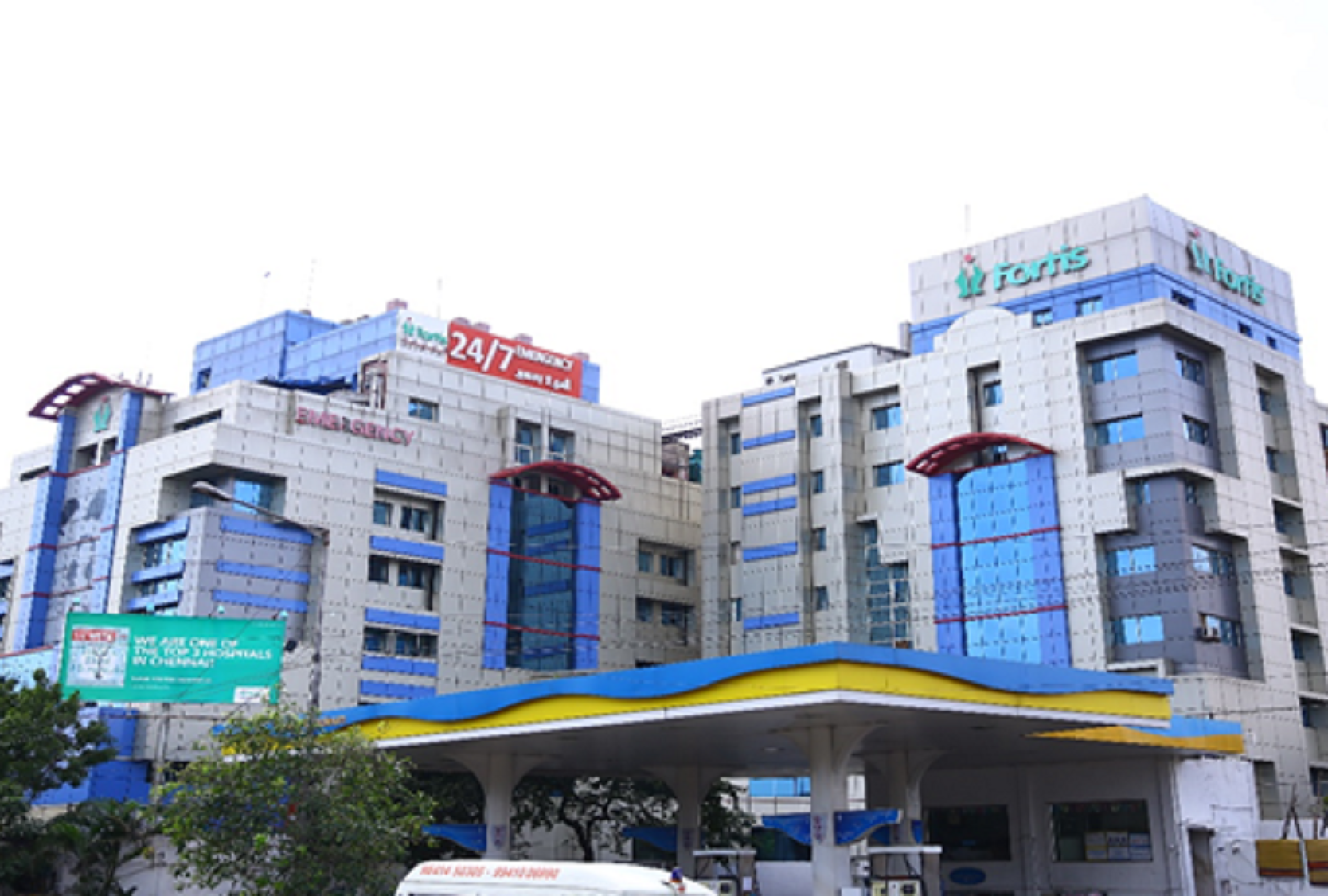
For the past 20 years, Fortis Healthcare has provided the Indian population with the finest calibre of individualised treatment. Fortis, widely regarded as Asia’s largest and fastest-growing hospital network, has been enabling the right treatment for you and your loved ones at the right time. It has been able to give top-notch healthcare with compassion and dignity because of its unwavering dedication to providing each person with great health care and caring service. With over 78 hospitals currently under its care, it hopes that its legacy of excellence in providing unmatched patient care continues for many years to come.
The doctors at Fortis Malar Hospital come from a large pool of ability and experience, and they are further assisted by a group of highly skilled, experienced, and committed support staff as well as cutting-edge technology. Over 11000 inpatients have been managed annually by 650 staff members and over 160 consultants. The hospital’s infrastructure includes a wide range of top-notch amenities such as roughly 180 beds, including about 60 ICU beds, 4 operating rooms, a state-of-the-art digital flat panel Cath lab, and a cutting-edge dialysis unit.
All about Fortis Malar Hospital;
- The leading comprehensive healthcare delivery service provider in India is Fortis Healthcare.
- This organisation’s healthcare verticals are mostly comprised of hospitals, diagnostic centres, and speciality daycare facilities.
- The Fortis Malar Hospital in Chennai provides comprehensive medical care in over 40 different specialities, including, but not limited to, cardiology, cardiothoracic surgery, neurology, neurosurgery, orthopaedics, nephrology, gynaecology, urology, paediatrics, and diabetes.
- Modern medical technology and committed patient care are Fortis Malar’s areas of expertise.
- To manage more than 11,000 in-patients, the hospital has 650 staff members and more than 160 consultants.
- The doctors at Fortis Malar Hospital come from a large pool of ability and experience, and they are further assisted by a group of highly skilled, experienced, and committed support workers, as well as cutting-edge technology.
- The hospital’s infrastructure includes a wide range of other top-notch facilities in addition to 180 beds, including roughly 60 ICU beds, 4 operating rooms, a cutting-edge digital flat screen Cath lab, and a state-of-the-art dialysis unit.
4. MIOT International
Location- Chennai, India
Established in- 1999
Total Beds- 1000
Multi-Specialty
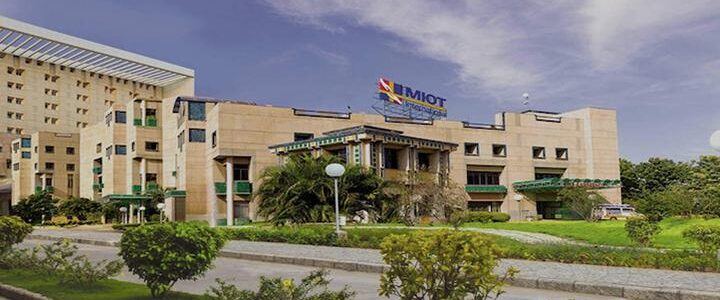
On February 12, 1999, Padmashri Prof. Dr P. V. A. Mohandas founded the Madras Institute of Orthopaedics and Traumatology (M.I.O.T. ), a 70-bed hospital with full-time physicians specialising in orthopaedic and trauma care. It soon became clear that several of the trauma patients, who were frequently transported there in a severe state, had pre-existing heart, kidney, and other organ issues. These pre-existing conditions have to be handled in addition to providing trauma care to stabilise and provide these patients with comprehensive end-to-end care.
In other instances, patients had organ injuries when they were admitted. Such illnesses required the knowledge of specialists to treat. It was crucial to have full-time specialists due to the nature of trauma care so that the appropriate care could be delivered timely. MIOT Hospitals / International was created as a result. Patients who have grown to rely on MIOT International as one of India’s top hospitals receive the best medical care available.
The 1000-bed MIOT has a staff of elite specialists that use its cutting-edge infrastructure and cutting-edge technology to heal and give hope to its patients. MIOT offers exceptional treatment in 63 specialities. MIOT International, consistently recognised as a leader in healthcare, draws clients from 130 different nations who seek our advice on achieving wellbeing.
All about MIOT International;
- A multi-speciality hospital having NABL and NABH accreditation, MIOT (Madras Institute of Orthopaedics and Traumatology) International was founded in 1999.
- The first hospital in India to have 750 HD CT scans with dual-energy imaging.
- Originally an orthopaedics facility, it is now a multispecialty facility that also offers services in neurosurgery, cardiology, thoracic and cardiovascular care, nephrology, oncology, and knee and hip replacements, plastic surgery, paediatrics, obstetrics, craniofacial and cosmetic surgery, and other fields.
- The hospital, which spans 14 acres, has won numerous honours, such as the Niryat Shree Gold Award in 2002 and 2009, the FIEO Niryat Shree Bronze Trophy in 2008, and the FIEO Southern Region Export Excellence Award in 2012, 2013, 2014, and 2015–2016.
- The hospital was also named by Times of India’s readers as Chennai’s Best Multispecialty Hospital, Best Hospital for Orthopedics, Best Hospital for Gastro & Gastrosurgery, and Best Hospital for Nephrology.
- In 2013, the first T- Replete Haplo Identical Bone Marrow Transplant in India was carried out by MIOT Institute of Hematology, Hemato-Oncology, and BMT.
- A 26-year-old woman with jaundice and a damaged liver who was failing quickly was saved by an urgent liver transplant.
- In 63 different disciplines, it has 300 full-time physicians and globally educated surgeons.
- Each year, the hospital saw almost 3,500 foreign patients or 25% of its total patient population.
- Quaternary care is provided by this 1000-bed hospital spanning 63 disciplines.
- The innovative structure of MIOT International provides patients with every convenience.
- Rooms on the campus provide views of the trees that have been planted extensively there.
- Outpatients, emergencies, attendants, and inpatients all have entrances.
5. MGM Healthcare
Location- Chennai, India
Established in- 1970
Total Beds- 400
Multi-Specialty

Doctors at MGM Treatment are dedicated to enhancing life with excellent healthcare. In Chennai, India, there is a 400-bed quaternary care multi-speciality hospital that is state-of-the-art, JCI, NABH, and LEED Platinum Certified. With world-class expertise supported by cutting-edge medical and digital technology, MGM Healthcare aims to provide exceptional clinical outcomes and patient experiences. Its goal is to develop an entire healthcare ecosystem for the provision of individualised medical treatment.
MGM Healthcare, a cutting-edge, super-speciality hospital in Chennai, Tamil Nadu, India, redefines the patient experience on all fronts via knowledge, technology, and a green facility. 400 beds, 100 ICU beds, 250+ doctors, 12 Centres of Excellence, 30+ departments, 12 operating rooms, and round-the-clock emergency care are all available at this quaternary care hospital.
To revolutionise the patient experience, MGM Healthcare will return medical care to its original foundational values of kindness and generosity along with quality and intelligence. Patients are at the centre of everything MGM Healthcare strives to do. High-quality, individualised care is made possible by the combined skills of a skilled group of surgeons, doctors, technicians, nurses, paramedics, office employees, and maintenance personnel.
All about MGM Healthcare;
- A 400-bed super speciality hospital, MGM Healthcare is located in Chennai.
- The hospital has obtained numerous achievements: A year with 102 heart transplants (3rd highest in the world); 110 transplants of paediatric hearts (Highest in Asia); Over 365 heart-lung transplant procedures, the most transplants performed in India.
- India has the most LVAD, RVAD, and BIVAD implantations.
- Over 25000 heart procedures have been carried out by the skilled staff.
- It is the first green hospital with USGBC LEED Platinum certification in India.
- Emergency care is available in the hospital around the clock.
- The hospital includes around 250 doctors and over 30 departments.
- Each challenging case is handled by a team of experts who offer all-inclusive therapy and care.
- The hospital offers 55 outpatient consultation rooms, all of which are supported by a strong infrastructure and cutting-edge technology.
- It contains 12 operating rooms and covers an area of 2.5 acres.
- For in-room care, it has voice-assist technologies.
6. SIMS Hospital
Location- Vadapalani, Chennai, India
Established in- 2012
Total Beds- 345
Super Specialty
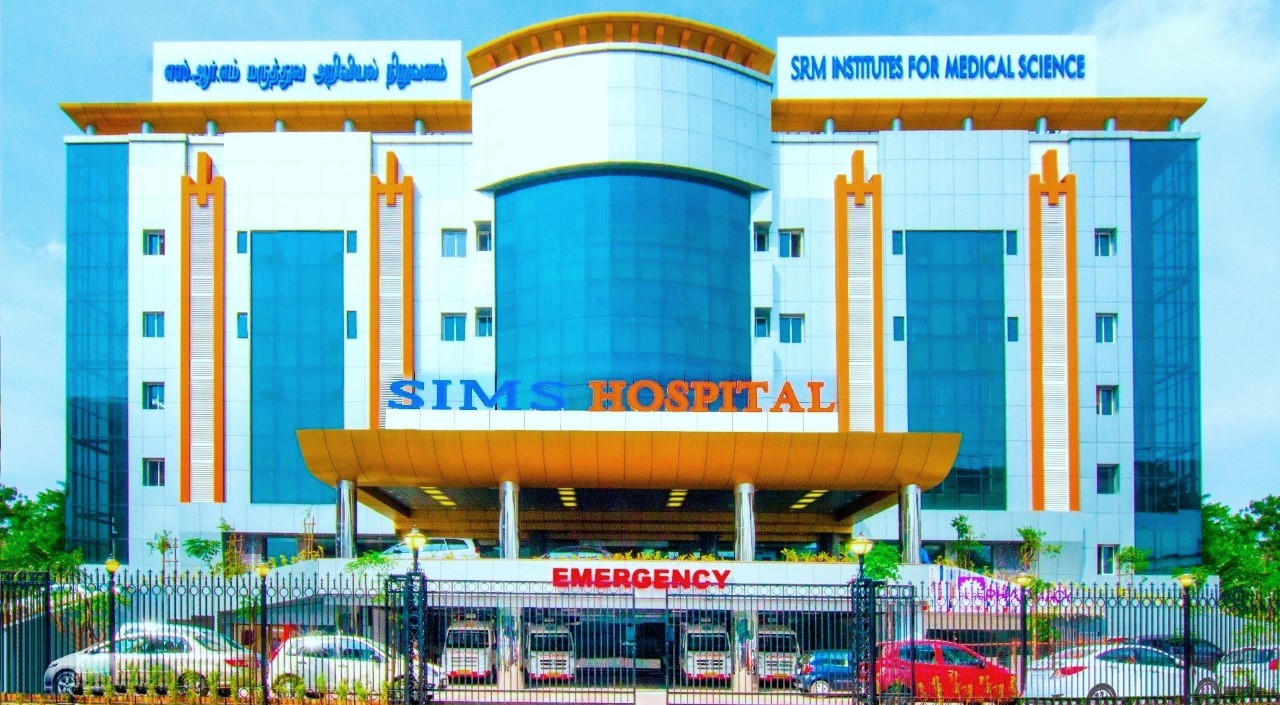
The SIMS Hospital in Chennai offers cutting-edge multi-super speciality healthcare services as well as 360-degree advanced tertiary care. Every action is intended to guarantee excellent patient care by combining the best experience, competence, cutting-edge technology, and well-coordinated patient-centric collaboration.
Following in the footsteps of the SRM Group, a sizable conglomerate with a dominant presence in education, medicine, transportation, and entertainment, the hospital aspires to build trust and excellence. The mission of SIMS Hospital, Chennai is to provide cutting-edge general and speciality medical care services, as well as to provide cross-speciality consulting for unrivalled patient experiences.
One of India’s multi-super speciality tertiary care hospitals with the quickest rate of growth is SIMS Hospital-Vadapalani, located in Chennai and spanning 2,30,000 square feet. The SIMS Hospital in Chennai has patient-friendly amenities that will guarantee the provision of superior patient care. The facilities are planned and furnished to satisfy the exacting needs of both domestic and foreign patients. The patient rooms are outfitted with all contemporary conveniences. Patients and family members have a fresh experience in the medical field since they are in a tranquil setting that gives them privacy and space.
All about SIMS Hospital;
- The SIMS Hospital in Chennai offers comprehensive tertiary healthcare services, including multi-super specialities and, very soon, a cutting-edge facility for multiple organ transplants.
- With its cutting-edge technologies, the hospital brings together renowned experts from all fields of medicine.
- The SIMS Hospital in Chennai is equipped with a variety of technology and resources, and it is run by a group of super-specialists who are empathetic and provide holistic care with the help of nurses, paramedics, and other members of our health service staff.
- The SIMS healthcare facilities are built and furnished to satisfy the exacting needs of both domestic and foreign patients.
- Over 2, 30,000 square feet, the hospital is crammed with restorative options for the sick and wellness options for those looking to stay well.
- The hospital has 345 beds, of which the ICU beds make up 30% of the total.
- It provides specialised and top-notch ICUs, dedicated operating rooms, and specialists for critical care centres, medial ICUs, neuro ICUs, paediatric ICUs, NEO Natal ICUs, cardiothoracic ICUs, and burns ICUs.
- Specially trained paramedics and technicians staff these intensive care units.
7. Sri Ramachandra Medical Centre
Location- Chennai, India
Established in- 1985
Total Beds- 1500
Multi-speciality
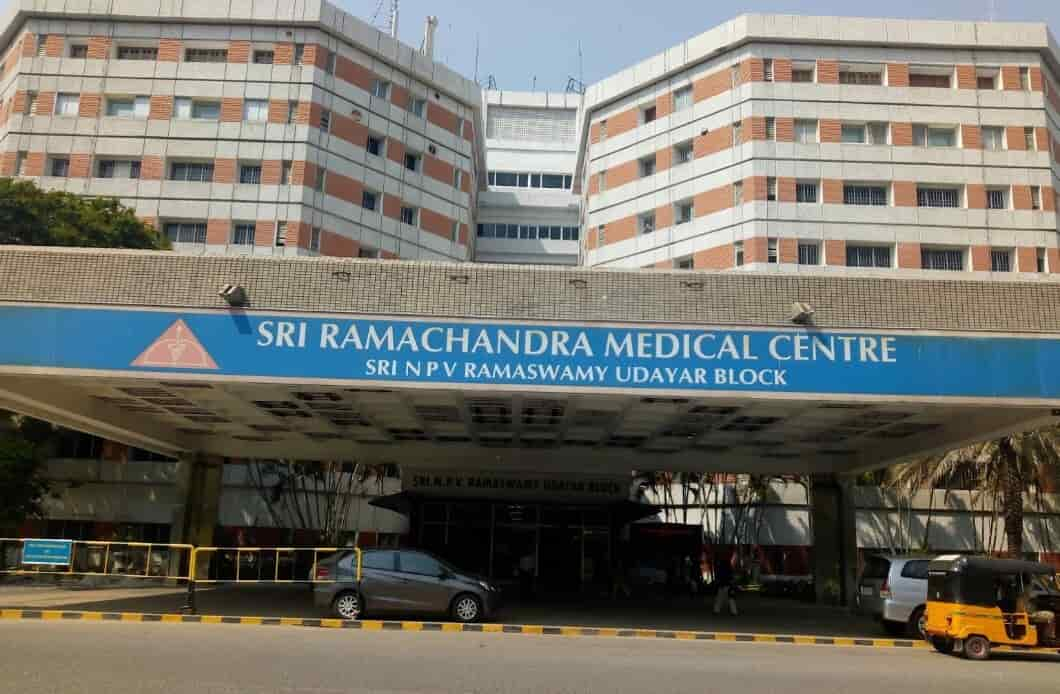
The Sri Ramachandra Medical Centre is a multispecialty quaternary care hospital that was first established as a teaching facility before becoming a fully operational top healthcare provider in Chennai. The hospital is the first and only one to have a medical university affiliation. It has earned excellent accreditations from organisations like JCI, NABL, AABB, and NABH. The centre is led by its vision, which is to strive for excellence in meeting community needs through improved patient experiences and clinical outcomes. The hospital has a biodosimetry lab with Atomic Energy Regulatory Board accreditation.
In Chennai, India, Sri Ramachandra Medical Centre (SRMC) is a multi-speciality university hospital. One of the largest private healthcare facilities in South Asia, SRMC has approximately 1,500 beds, 114 ICU beds, 25 operating rooms, and a campus that spans 175 acres (71 hectares). It is situated in the Porur neighbourhood. It has 1,800 beds and was established in 1985.
The Sri Ramachandra Medical Center received accreditation from the National Accreditation Board for Hospitals & Healthcare Providers and Joint Commission International from March 2009 to June 2012. (NABH). This distinction came about as a result of a close partnership with Partners Harvard Medical International’s healthcare improvement specialists.
All about SRMC;
- Sri Ramachandra Medical Centre (SRMC), a tertiary care multi-speciality University Hospital, was founded in 1985.
- It is one of the biggest private healthcare centres in South Asia, covering 175 acres.
- The hospital, which is a pioneer in providing state-of-the-art care to patients in South India, is accredited by NAAC, NABH, NABL, and ISO 9001:2000.
- Every year, the hospital sees around 35,000 inpatients and 2,50,000 outpatients.
- In more than 50 specialities and super-specialities, it excels.
- In all surgical and medical specialities, the hospital boasts the top doctors, surgeons, and healthcare professionals.
- Staffed by qualified emergency physicians and other specialists, the 24-hour emergency care facility is equipped to treat patients who require critical care.
- The hospital’s top physician, Dr Ravikumar, is also a distinguished member of the National Academy of Medical Sciences and the Bureau of India Standards.
- This hospital has more than 1500 beds, 114 ICU beds, and 25 operating rooms. It is an eight-story structure with a built-up area of more than 2 million square feet.
- The hospital offers a variety of room types, such as the Super Deluxe Suite (VIP), Single Room, Deluxe Room, and Semi-Private Room.
- The hospital’s 6000 sq. ft.-sized laboratory, which is completely air-conditioned, runs about 10,000 diagnostic tests daily.
8. Apollo Spectra Hospital
Location- Chennai, India
Established in- 1970
Total Beds- 47
multi-speciality
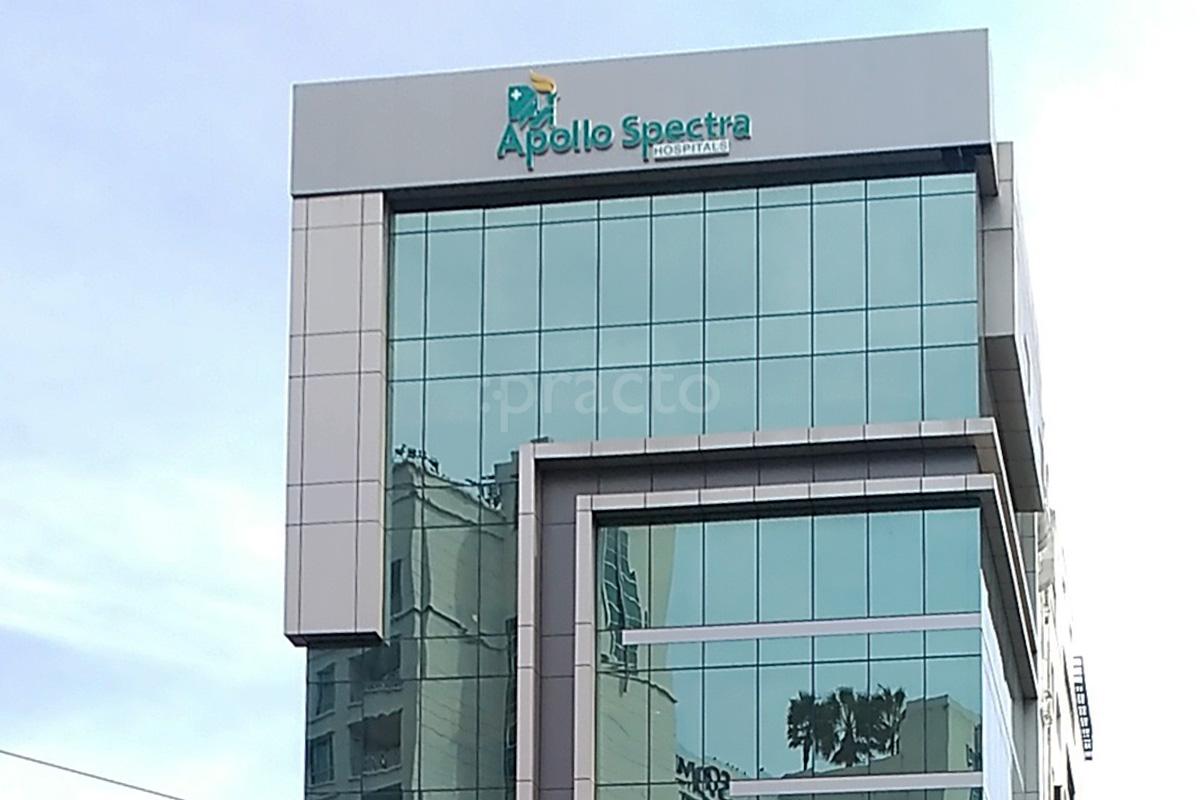
Apollo Spectra, a speciality hospital, offers you the advantage of receiving expert healthcare with all the advantages of a large hospital in a cosier, more welcoming setting. The hospital is distinctive because of this.
Apollo Spectra Hospitals continue to set new benchmarks in healthcare services with 17 centres spread across 12 cities: Bengaluru, Chennai, Delhi, Gurugram, Kanpur, Mumbai, Gwalior, Hyderabad, Jaipur, Noida, Patna, and Pune. It has also performed over 2,50,000 successful surgeries with excellent clinical results.
The best medical professionals, cutting-edge technology, and cutting-edge infrastructure combine to give individualised care that promotes faster healing with almost no risk of infection. Its simple admission and discharge processes guarantee that its patients’ experiences are stress-free. This is why patients throughout the country rely on this hospital.
All about Apollo Spectra Hospital;
- Apollo Spectra Hospital offers the advantage of skilled and high-quality healthcare in a more accessible setting because of its world-class facilities and cutting-edge technologies.
- It provides exceptional care in more than 12 surgical specialities, including urology, ENT, general and laparoscopic surgery, orthopaedic and spine surgery, and bariatric surgery.
- The hospital is dedicated to combining the greatest healthcare management strategies available with top-notch medical care.
- To deliver the greatest healthcare services, there are more than 150 experts, including 90 specialist consultants.
- The hospital, which covers a floor space of more than 44000 square feet, includes 5 ultra-modern OTs, an on-site pharmacy, a rehabilitation centre, and a waiting area for patients. Seven of its beds are set aside for critical care services.
9. Vijaya Hospital
Location- Chennai, India
Established in- 1972
Total Beds- 750
Super Specialty
![]()
Vijaya Hospital has been offering the community high-quality medical care since its establishment in 1972. The trust was established by Shri. B. Nagi Reddi, a Dada Saheb Phalke Award winner and the creator of one of the most well-known film studios in the nation, Vijaya Vauhini Studios.
The Vijaya Health Centre opened its doors in 1987, and the Vijaya Heart Foundation, a centre for super-speciality cardiac care, was founded in 1996. The Centre, which specialises in beating heart procedures, has carried out more than 13,000 of them. It is among the top facilities in India for beating heart operations. Additionally, it has carried out more than 50,000 angio operations. A specialist centre for trauma & orthopaedic services, the Vijaya Institute of Trauma & Orthopaedics, was soon established.
The Vadapalani-based Vijaya Hospital offers a wide variety of services to meet the various needs of its clients. The employees at this hospital are polite and quick to offer any assistance. Any questions or inquiries you may have are promptly answered by them. The hospital accepts any of the accepted payment methods, including cash, credit cards, debit cards, master cards, and visa cards, to help the patients easily pay.
All about Vijaya Hospital;
- One of the first multi-speciality hospitals in Chennai was Vijaya Hospital, which opened its doors in 1972.
- The Vijaya Medical and Educational Trust (VMET), was founded by Sri. B. Nagi Reddi, a recipient of the Dada Saheb Phalke Award and the creator of Vijaya Vauhini Studios, is home to this NABL and NABH accredited hospital.
- The Vijaya Eye Foundation, Vijaya Hospital (VH), Vijaya Heart Foundation (VHF), and Vijaya Health Center make up the trust (VHC).
- Vijaya Health Centre was founded in 1987 and has already completed more than 13,000 beating heart surgeries and more than 50,000 angio treatments.
- The largest centre in South India, Vijaya Health Centre is equipped with all cutting-edge technology and all of the hospital’s amenities.
- As a specialised facility for trauma & orthopaedic services, the Vijaya Institute of Trauma & Orthopedics was founded.
- The hospital’s primary goals are to treat patients with compassion and dedication while offering high-quality healthcare at a reasonable cost.
- Doctors who specialise in a variety of healthcare specialities work at this multi-speciality hospital.
- The facility provides patients with counselling, Ayurveda, surgery, and medication assistance.
- It has its own mother’s milk bank, blood bank, foot clinic, pathology department, rehabilitation centre, pharmacy, and diagnostic centre.
- The hospital presently has more than 750 beds, up from an original bed strength of 30.
- The hospital offers cottages that are kept to the greatest standards and have all the luxuries.
- Within the campus, there is a food court where a broad range of cuisine may be ordered.
10. Dr Rela Institute and Medical Centre
Location- Chennai, India
Established in- 2018
Total Beds- 450
multi-speciality

An international medical facility called Dr Rela Institute & Medical Centre is a quaternary care hospital committed to promoting and meeting the requirements of a wide range of patients. Located on a huge 36 acres of land in Chromepet, Chennai, India, this multispecialty hospital is dedicated to becoming a globally significant healthcare system with the most modern infrastructure facilities.
The hospital offers 450 beds total, including 130 beds for critical care, 9 operating rooms, cutting-edge reference labs, and imaging capabilities. This centre is conveniently close to air, rail, and road transportation. The Dr Rela Institute & Medical Center (RIMC) was founded to offer top-notch clinical care. It has combined a team of highly skilled medical specialists who are leaders in their professions with cutting-edge infrastructure.
It has the vision to improve the health of the people it serves, with dedication and commitment. By upholding the best standards in patient care, it hopes to innovate and take the lead. It promises total dedication from both doctors and staff. Because it thinks that technology can fill in treatment gaps, it might be one of India’s most technologically advanced multispecialty hospitals.
All about Dr Rela Institute and Medical Centre.
- Dr Rela Institute and Medical Centre, a quaternary care hospital founded by renowned liver transplant surgeon Dr Mohamed Rela, is committed to meeting the needs of a wide range of patients.
- By performing a liver transplant on a 5-day-old newborn, the hospital’s founder, Dr Rela, set a world record and gained recognition in the Guinness Book of Records.
- The hospital has 450 beds, including 130 critical care beds, 14 operating rooms, imaging facilities, and modern reference labs, all within close access to the airport, rail, and road.
- Dr Mohamed Rela is the Chairman and Director of the DDrRela Institute and Medical Center and has completed more than 4000 liver transplant surgeries.
- The hospital has a well-trained staff and nurses that are available to patients around the clock.
- The hospital is situated on 36 acres of land and features cutting-edge infrastructure.
- One of the largest intensive care units for the liver is located in the hospital.
- One of the largest liver-specific intensive care units will be present there.
Conclusion
Healthcare is a right that applies to everyone, not just the wealthy. However, the healthcare services have not been able to reach 60% of the Indian population due to poorer infrastructure in terms of quality, lack of accessibility to medical facilities and medications needed for everyday life, and a shortage of skilled medical professionals. In rural areas, the majority of the medical facilities are appalling. It is important to make sure that every person must have access to high-quality healthcare services, and no one should be denied these benefits because of their financial situation.



